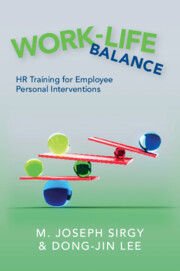Book contents
13 - Conclusion
from Part IV - Epilogue
Published online by Cambridge University Press: 19 January 2023
Summary
This chapter summarizes much of the books content, which is divided into three parts. The first part (Chapters 1-3) describes the conceptual foundation of the research on work-life balance (definitions, importance of the construct, and the link of the construct to employee wellbeing). The second part (Chapters 4-8) describes five behavior-based, personal interventions that people commonly used to achieve work-life balance, namely (1) engaging in multiple roles and domains, (2) increasing role enrichment, (3) engaging in behavior-based compensation, (4) managing role conflict, and (5) creating role balance. Part 3 of the book (Chapters 9-12) focuses on four personal interventions of work-life balance that are cognition-based. These are (1) segmenting roles and domains, (2) integrating roles and domains, (3) engaging in value-based compensation, and (4) applying whole-life perspective in decision-making. Based on the psychological principles underlying these nine personal interventions, we developed concrete training material for instructors of work-life balance to use in the context of workshops and seminars.
Keywords
- Type
- Chapter
- Information
- Work-Life BalanceHR Training for Employee Personal Interventions, pp. 155 - 168Publisher: Cambridge University PressPrint publication year: 2023



